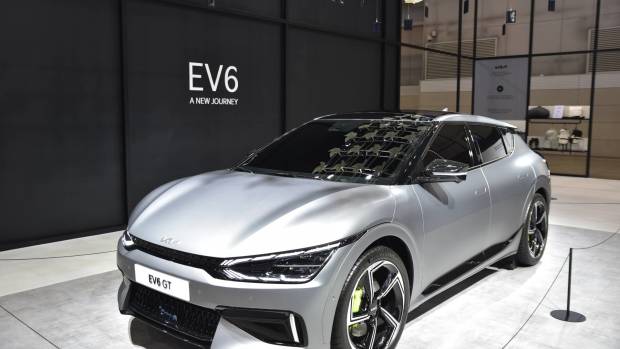
Vehicle recalls and regulator investigations into equipment defects are necessary safety actions to prevent injury or death to owners and occupants of all-electric, hybrid or internal combustion engine vehicles.
Sometimes a vehicle recall can be something as simple as an over-the-air software update, which Tesla (TSLA) -) has issued for some of its vehicles, or something more complicated and time-consuming such as an equipment replacement.
DON'T MISS: Tesla Rival Fisker Unveils Its Luxury Sports Electric Vehicle
The National Highway Traffic Safety Administration has issued several recalls and opened investigations into EV equipment defects. Mercedes-Benz (MBG), for example, on June 12 filed a voluntary Safety Recall Report for 7,558 vehicles, which include 4,285 of its 2022 EQS 450 and 2,522 of its 2022 EQS 580 EVs, as well as S580e plug-in hybrids and Maybach S580 and S680 ICE vehicles.

Mercedes Benz Has Recalls
Mercedes was alerted to the problem in January 2022 after it received a report of a vehicle losing functionality of its dynamic control systems that include the anti-lock brake system, acceleration slip regulation and electronic brake force distribution, as well as the speedometer during operation.
Mercedes on June 9 notified dealers of another voluntary recall of 8,281 all-electric vehicles, including its EQE, EQS and EQS SUV models for a malfunction of the electrical drivetrain possibly causing a loss of propulsion. Analysis of the malfunction, according to the Safety Recall Report, determined a potential safety risk could not be ruled out. The electrical drivetrain software would be updated on the affected vehicles to solve the problem, Mercedes said. Car owners will be notified of the recall on Aug. 4.
Tesla had recalls this year involving over-the-air software updates that CEO Elon Musk disputes as being a recall, since they don't require vehicles to be taken to a dealer for repairs. In May, the company had a recall that involved 1.1 million Tesla vehicles in China for a software update that allowed for changes to braking methods and more warnings about the use of accelerator pedals..
The Austin, Texas EV maker had other equipment recalls and investigations including in March when the NHTSA opened an investigation into 100,000 Tesla 2023 Model Y SUVs over an issue with steering wheels coming off while driving.
The NHTSA also reopened an investigation into Tesla that it closed in 2021, which covers about 1.8 million EVs sold in the US, including Model S, Model X, Model 3 and Model Y vehicles. The federal agency in January 2020 received a petition regarding a sudden unintended acceleration problem with Teslas, but denied the petition a year later.
The agency had second thoughts on denying the petition after Office of Defects Investigation on June 29 received another petition regarding unintended acceleration of Tesla EVs that alleges there is a design flaw in the inverter design that allows an intermittent higher electrical current to flow through a vehicle's 12-volt electrical system. The additional voltage draw could be caused by a demand for more power from an accessory, which could also prevent Tesla's diagnostics system from identifying it as a fault.
Regulator Opens Investigation Into Kia EVs
NHTSA recently opened an investigation into South Korean EV maker Hyundai's (HYMTF) -) affiliate Kia after the Office of Defects Investigations received 11 complaints from 2022 Kia EV6 owners about unexpected loss of power in their vehicles, InsideEVs reported. Owners heard loud pop noises, a warning display on their dashboard and a reduced or total loss of power.
The regulator's engineers are requesting information from Kia regarding the complaints in the preliminary evaluation phase. Kia can issue a voluntary safety recall if it deems it necessary, but NHTSA will either close the case or move to the next phase after the evaluation. The agency would likely send a safety recall request letter if a safety defect is found.







